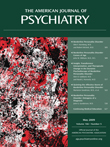Hallucinations in the Context of Varenicline Withdrawal
To The Editor: Varenicline is a partial agonist of the a 4 b 2 subtype of the nicotinic acetylcholine receptor. Licensed in 2006, the drug is the first of this type used for smoking cessation in adults, and it has shown to be a promising agent (1) . Varenicline has both agonistic and antagonistic properties, which are believed to account for a reduction in nicotine craving and withdrawal symptoms as well as blocking the rewarding effects of smoking (2 , 3) . However, concerns have been raised regarding varenicline-induced psychotic disturbances in persons with previous mood disorders (4 , 5) . We report the case of varenicline withdrawal leading to psychosis.
“Mr. A” was a 43-year-old, well-educated, healthy man with no current or previous medical or psychiatric history, including no past alcohol dependence or drug abuse. Notably, his family history was positive for schizophrenia, with one brother suffering from the illness. The patient reported smoking 10 cigarettes daily for more than 20 years. Varenicline was administered at a dose of 0.5 mg once daily for an initial period of 3 days, followed by 0.5 mg twice daily for the next 4 days. The drug was then administered at a dose of 1.0 mg twice daily.
The patient reported headaches shortly after starting varenicline. However, he was able to stop smoking after 2 weeks of treatment and therefore reduced the dose of the drug during the third week of treatment, taking only 0.5 mg once daily for 4 days. He then discontinued treatment. After taking the last tablet of varenicline on the following day, the patient began experiencing symptoms of derealization. His symptoms then progressed to visual hallucinations of unknown, distressing people who he “shooed” away. At that point, Mr. A suspected that he was having a “realistic dream.” He also perceived that he had a conversation with a deceased rock star while being conscious that the person in question was actually dead. He became distressed and presented to his general practitioner, and he was started on quetiapine (50 mg at bedtime) for 10 days. The symptoms of hallucinosis rapidly disappeared. When interviewed by a psychiatrist 1 month later, the patient showed no symptoms of any psychiatric disorder, and he was not taking any medication. He had also managed to remain smoke-free.
To the best of our knowledge, this is the first reported case of varenicline withdrawal leading to psychosis. The psychosis may have occurred because of downregulation of the cholinergic system such that the abrupt lack of cholinergic stimulation, as a result of withdrawal from varenicline, induced a rebound effect that simulated an anticholinergic hallucinosis. Our case highlights the need to use caution when prescribing the drug to patients with a history of psychotic symptoms or a family history of psychotic illness. In particular, clinicians should be careful with abrupt reduction or termination of the medication, since withdrawal symptoms may be linked to psychosis.
1. Cahill K, Stead LF, Lancaster T: Nicotine receptor partial agonists for smoking cessation. Cochrane Database Syst Rev 2008 Jul 16; (3):CD006103Google Scholar
2. Mihalak KB, Carroll FI, Luetje CW: Varenicline is a partial agonist at alpha 4 beta 2 and a full agonist at alpha 7 neuronal nicotinic receptors. Mol Pharmacol 2006; 70:801–805 Google Scholar
3. Mohanasundaram UM, Chitkara R, Krishna G: Smoking cessation therapy with varenicline. Int J Chron Obstruct Pulmon Dis 2008; 3:239–251Google Scholar
4. Kohen I, Kremen N: Varenicline-induced manic episode in a patient with bipolar disorder. Am J Psychiatry 2007; 164:1269–1270Google Scholar
5. Pumariega AJ, Nelson R, Rotenberg L: Varenicline-induced mixed mood and psychotic episode in a patient with a past history of depression. CNS Spectr 2008; 13:511–514Google Scholar



